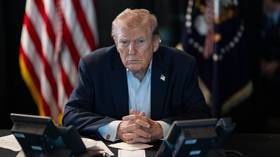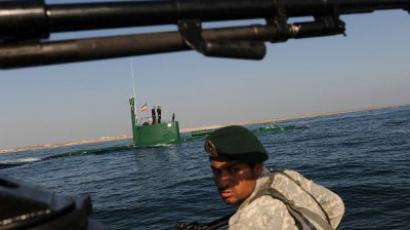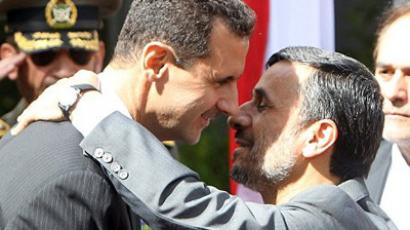‘Economic blockade of Iran is an act of war’
Tension around Iran has spiralled. Tehran is carefully avoiding being provoked so as not to vie the US and Israel an excuse for military action. Though activists believe the extra sanctions and economic blockade of Tehran is already an ‘act of war’.
RT has talked to Brian Becker, the national coordinator of the A.N.S.W.E.R. anti-war coalition on the reasons behind the instability in the region. He believes the US government has manufactured an artificial crisis in the area. “Iran is complying with the IAEA. Iran does not have a nuclear weapon, Iran is not threatening its neighbors, Iran has not started a war with any of its neighbors,” says Becker. He also points out that Israel, on the other hand, has “hundreds of nuclear weapons” and, unlike Iran, refuses to sign a nuclear cooperation treaty and does not allow IAEA inspectors into its country. “So there’s not really a nuclear menace or a nuclear danger from Iran. So what’s the cause of the artificial crisis?” he questions. “The real goal is that the US government has embarked on a course of extreme economic aggression against Iran with the whole debate creating economic suffering, economic isolation, economic misery,” he explains. “So a part of the population will rise up or become displeased with the government. So that the US can – as it has in history – carry out regime change”.The US government however denies it is after regime change in Iran. But Becker warns we have to take such denials with a very big pinch of salt. “Since 1979 the US refuses to have relations with the Islamic republic of Iran. Why?” he questions. “Is it because Iran is a dictatorship? Well, it is actually a democratic government. It has democratic features far beyond some of America’s foremost allies in the Middle East, such as Saudi Arabia, for instance.”Becker explains that since 1979 Iran became an independent government. Before that, between 1953 and 1979 when the Shah was there, the Shah acted basically as a proxy or a puppet or a client of American power. And even though the US refuses to admit they are carrying out regime change, in fact everyone who is watching knows US policy is to create pressure on Iran, carry out covert operations and economic sanctions, he says. “These new sanctions are not really even like the old sanctions. They are saying to the rest of the world: “If you dare do business with Iran’s Central Bank, if you buy Iranian oil – which constitutes half of Iran’s GNP – if you have any business with Iran whatsoever, you will not have access to American banks, corporations, or markets.” Becker says that this is a de facto economic blockade of Iran, and adds that by international law an economic blockade is an ‘act of war’. He believes Iran has been very prudent even though they said they would consider closing the Strait of Hormuz. And even though the Western media has made much fuss about that, Iran has not done anything to give the US a pretext, an excuse, a provocation that would trigger the US or Israel into military action.Becker is sure the Israelis are trying to pretend that Iran constitutes an existing threat to Israel. He does not think that is the case, however, even with Iran’s military capability to do great damage to Israel in the event of war – as “Israel is a nuclear power.” “I think the Israeli government has a pattern and a practice of invasion and bombing of its neighbors in the Middle East,” he explains. “It carried out the bombing of Iraq’s nuclear facility in 1981 even though it was permitted by international law and subject to IAEA inspections. In other words, a nuclear program for civilian energy purposes, Israel came and bombed it. They did the same to Syria in the last few years. And they would like to carry out a military strike against the Iranian government.” But Becker is convinced the Americans don’t want that right now, even though they are happy to have Iran in a state of tension. They don’t really want Israel to become the main protagonist with the Iranian government by carrying out an unprovoked military strike. “Because that would then present the crisis as a struggle between the Islamic republic of Iran on one side and the Israeli Zionist regime on the other,” he explains. “And in that case Iran would be able to mobilize mass support throughout the Middle East for it. The US has a different tag. They want to keep Israel sort of in the background, looming, dangerously threatening Iran in one way, keeping Iran in a state of tension, perhaps militarily but have the economic sanctions do the bulk of the work by carrying out economic and financial isolation against the Iranian government. They think in the long term is it the easier way, the better way, the more effective way to carry out the regime change.” But he says anti-war activists are starting to concentrate their efforts in exposing that the US government is carrying out through a different set of tactics the same thing they did in Iraq. “They carried out the regime change in Iraq,” he says “Not to make Iraq more democratic, more human rights oriented but to dominate Iraq. And I think they want to do that in Iran as well. And we need to have people outside of Iran stand up and say “Iran should not be alone in this”. But he adds that Iran has certain allies. Iran has Russia, and it has China. Increasingly it has Venezuela and Cuba. In other words, those governments in the world, in addition of course to Syria, which has its own problems right now, who don’t want the entire world to be dominated by one power – the US. They recognize Iran needs to remain an independent government, he says. If the US were to be successful in carrying the regime change in Iran, it may embolden them to carry out further destabilizing efforts against other powers, including Russia and China.














